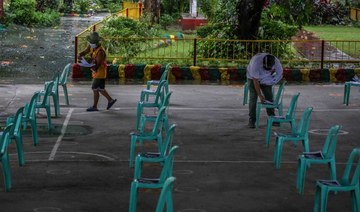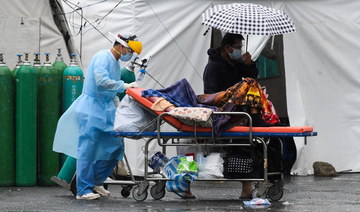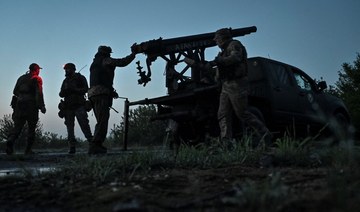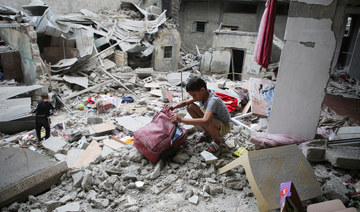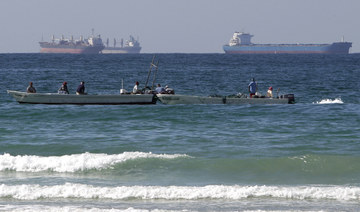MANILA: The Philippines said on Tuesday it will expand its COVID-19 vaccination program to include the general public and children aged 12-17 years old for the first time from October to achieve herd immunity and gradually return to normal life.
The Southeast Asian nation of 110 million people has reported one of the highest numbers of COVID-19 cases and deaths in Asia since the pandemic began last year, prompting authorities to impose strict anti-virus measures in the worst-affected areas and relax curbs in other parts to spur economic activity.
Still, vaccination measures have been slow, with only 20.3 million or 26 percent fully vaccinated and 23.6 million receiving their first dose since March when the government launched its vaccination drive for five priority groups, including health workers, senior citizens, those with comorbidities, economic frontliners, and indigents.
"The good news is, the president has approved the vaccination of the general population beginning October," President Rodrigo Duterte's spokesperson, Harry Roque, said in a press briefing.
"We will also start inoculating children (between 12 to 17 years of age) ...in October. This has also been approved by the president," he added, urging parents to register their children for the vaccination.
Malacañang's announcement comes a day after Duterte threatened to invoke police power of the state on those who refused to get vaccinated.
In a recorded address aired on Monday night, Duterte implored the public to get immunised, specifically Filipinos residing in areas with ample COVID-19 vaccine shots.
“Government has no power to compel any religion, faith, or church...We can only cooperate. But the police power of the state can be invoked if you pose a threat to others... (because) then you are already a danger to society,” he said.
Duterte further explained that once the Philippines had achieved herd immunity through mass immunization, it would be "safe to gradually ease restrictions."
“I now encourage you — those who have yet to receive the vaccines — to get inoculated...We are almost pleading down on our knees," he said.
The Philippines leader warned government employees to leave their office if they refuse vaccination, especially those at the frontline or tasked with interacting with people.
Citing a report from the Food and Drug Administration (FDA), Duterte said that unvaccinated persons who got infected with COVID-19 are likely to get hospitalized with more severe or critical conditions compared to those who were already inoculated.
Meanwhile, Edre Olalia, president of the National Union of People's Lawyers (NUPL), said on Tuesday that whether or not the president could implement police power to compel those who refuse to get vaccinated was a "tricky, debatable and complicated" matter.
"As a general rule, the State can invoke police power for the protection of life, public health and for the public interest. But there are loose ends that need to be tied up. These include questions of liberty, necessity, privacy, proportionality, coverage, parameters and even sanctions of specific measures to make it compulsory or mandatory," he told Arab News.
"Yet resort to the use of police power under the circumstances in the country dodges or ignores questions on availability and access to the vaccines as well as to the who, when and where," he added.
Olalia said the move also "glosses over the fact that all measures or responses of the government thus far have been confused and confusing."
Meanwhile, in his report to the president, National Task Force Against COVID-19 chief implementer Secretary Carlito Galvez, Jr. said that the Philippines was expecting the delivery of COVID-19 jabs to reach 100 million by October end.
Galvez added that economic centers such as Metro Manila, Baguio City, Cebu City, Iloilo City, and Davao City had surpassed the 50 percent vaccination targets in their areas.
Locals, for their part, elicited mixed reactions to the government's move.
One parent who asked not to be named, said "it would be better if vaccination against COVID-19 is compulsory but not coercive", just as it is in the case of other vaccines.
Mariel San Diego, a fully vaccinated government employee based in Luzon island's Pampanga province, said it would be better for the president to allow local government units to act on the matter. "Or if he really wants to do it, maybe he should start in his home city, Davao," San Diego told Arab News.
Others said individuals should be allowed to exercise their choices.
"The virus does not come from the unvaccinated. Both vaccinated, and unvaccinated can be carriers or transmitters. My choice of not getting the vaccine is from my family's history of allergic reactions. I could die with just a shot," Virginia Pasalo, a resident of Pangasinan province, said.
"These vaccines also lack clinical trials. I will wait for other medications to be available," she added.
Philippines to begin vaccinating children against COVID-19 from October
https://arab.news/ypd73
Philippines to begin vaccinating children against COVID-19 from October
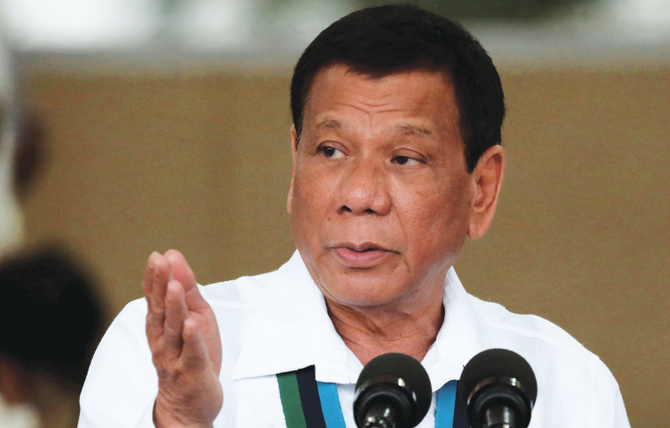
- Health authorities to widen program to include 12-17 year olds, general public to reach herd immunity, government says
Afghan Taliban’s treatment of women under scrutiny at UN rights meeting
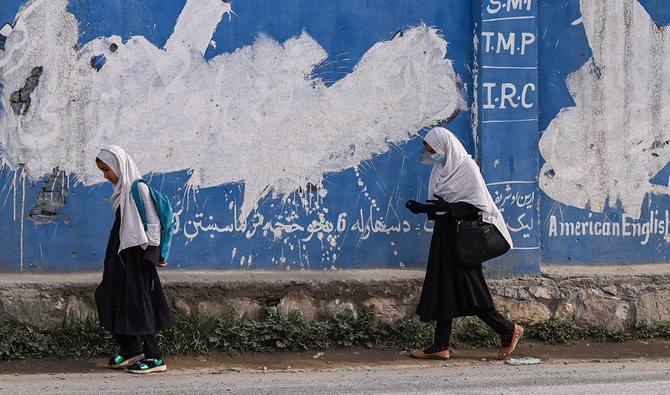
- The Taliban say they respect rights in line with their interpretation of Islamic law
- Taliban have barred girls from high school and women from universities and jobs
GENEVA: Afghanistan’s Taliban face criticism over their human rights record at a UN meeting on Monday, with Washington accusing them of systematically depriving women and girls of their human rights.
However, in an awkward first for the UN Human Rights Council, the concerned country’s current rulers will not be present because they are not recognized by the global body.
Afghanistan will instead be represented by an ambassador appointed by the previous US-backed government, which the Taliban ousted in 2021.
In a series of questions compiled in a UN document ahead of the review, the United States asked how authorities would hold perpetrators to account for abuses against civilians, “particularly women and girls who are being systematically deprived of their human rights“?
Britain and Belgium also raised questions about the Taliban’s treatment of women. In total, 76 countries have asked to take the floor at the meeting.
The Taliban say they respect rights in line with their interpretation of Islamic law.
Since they swept back into power, most girls have been barred from high school and women from universities. The Taliban have also stopped most Afghan female staff from working at aid agencies, closed beauty salons, barred women from parks and curtailed travel for women in the absence of a male guardian.
Under the US system, states’ human rights records are subject to peer review in public meetings of the Geneva-based Human Rights Council, resulting in a series of recommendations.
While non-binding, these can draw scrutiny of policies and add to pressure for reform.
The UN Human Rights Council, the only intergovernmental global body designed to protect human rights worldwide, can also mandate investigations whose evidence is sometimes used before national and international courts.
Indian students protest US envoy’s campus talk over Gaza war
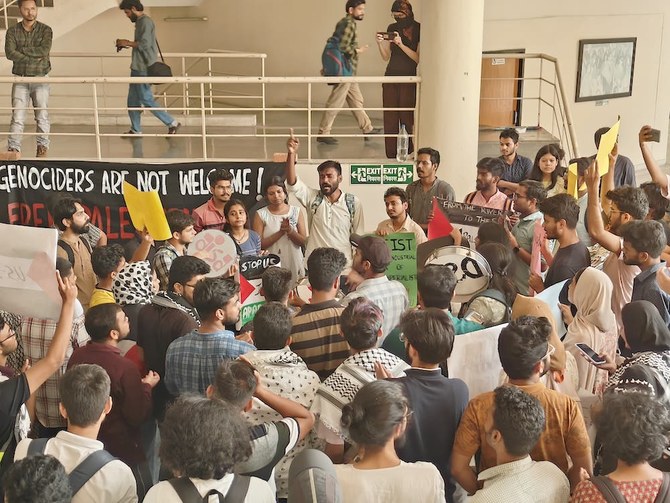
- Student-led protest led to university canceling an event involving US ambassador
- Indian students say they stand in solidarity with students protest across US
NEW DELHI: Students at one of India’s most prominent universities gathered in protest over an event involving the US ambassador to New Delhi on Monday, as they stood up against American support for Israel’s war on Gaza.
US Ambassador to India Eric Garcetti was invited for a talk on US-India ties at the Jawaharlal Nehru University in New Delhi on Monday afternoon, which would take place amid protests on American campuses demanding their universities cut financial ties with Israel over its military offensive in Gaza, which has killed more than 34,000 Palestinians.
At the university’s convention center, over 100 students organized by the Jawaharlal Nehru University Student Union protested the invitation of Garcetti, calling out his complicity “in the genocide Israel is currently doing in Palestine.”
JNUSU President Dhananjay told Arab News: “By calling such a person in the university … who is supporting the genocide, we want to tell them that JNU is not silent on this issue and we want to speak up.
“We are protesting against the US support for the genocide in Gaza committed by Israel.”
Hundreds of US college students have been arrested and suspended as peaceful demonstrations calling for a ceasefire in Gaza and divestment from companies linked to Israel spread across American campuses.
The student-led movement comes after nearly six months since Israel began its onslaught on the Gaza Strip, which Tel Aviv said was launched to stamp out the militant group Hamas.
Hundreds of thousands of housing units in the besieged territory have either been completely or partially destroyed, while the majority of public facilities, schools and hundreds of cultural landmarks have been demolished and continue to be targeted in intense bombing operations.
JNU student leaders said they stood in solidarity with the protesting students in the US.
“We are students, and we need to ask questions. If some atrocities are taking place and there are mindless killings going on, speaking out against this should be the responsibility of all sections of society,” Dhananjay said.
“The visuals that we see make us shiver and shake our conscience. If we don’t speak up, then I don’t think we have a right to be a social being.”
At the JNU campus on Monday, the student protest led to a cancellation of the event involving the US envoy.
“We feel happy that we forced the administration to cancel the talks by the ambassador,” JNUSU Vice President Avijit Ghosh told Arab News.
Despite India’s historic support for Palestine, the government has been mostly quiet in the wake of Israel’s deadly siege of Gaza.
When Indians went to the streets in the past months to protest and raise awareness on the atrocities unfolding in Gaza, their demonstrations were dispersed by police and campaigns stifled.
Members of Indian civil society have since come together to challenge their government’s links with Tel Aviv and break Delhi’s silence on Israel’s war crimes against Palestinians, reflecting similar concerns that some university students also felt.
“The US is supporting Israel in the killing of Palestinian people in Gaza. It’s also suppressing students in its country who are raising voice against the genocide in Gaza,” Ghosh said.
“We are agitated that India is being a mute spectator and not taking a clear stand against the ongoing genocide in Gaza.”
Ukraine’s Zelensky urges US to speed up weapons deliveries
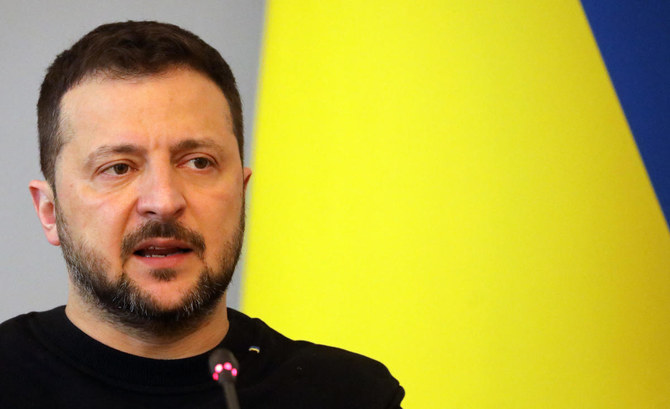
KYIV: President Volodymyr Zelensky said on Monday that vital US weapons were starting to arrive in Ukraine in small amounts and that the process needed to move faster as advancing Russian forces were trying to take advantage.
Zelensky told a joint news conference in Kyiv alongside visiting NATO chief Jens Stoltenberg that the situation on the battlefield directly depended on the speed of ammunition supplies to Ukraine.
“Timely support for our army. Today I don’t see anything positive on this point yet. There are supplies, they have slightly begun, this process needs to be sped up,” he said.
Scotland’s Humza Yousaf quits in boost to Labour before UK vote
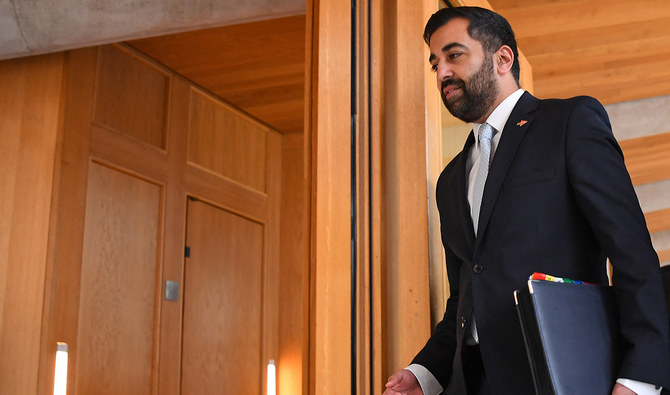
- Yousaf quit after a week of chaos triggered by his scrapping of a coalition agreement with Scotland’s Greens
- He then failed to secure enough support to survive a vote of no confidence against him expected later this week
LONDON: Scotland’s leader Humza Yousaf resigned on Monday, further opening the door to the UK opposition Labour Party regaining ground in its former Scottish heartlands during a national election expected to be held later this year.
Yousaf said he was quitting as head of the pro-independence Scottish National Party (SNP) and first minister of Scotland’s devolved government after a week of chaos triggered by his scrapping of a coalition agreement with Scotland’s Greens.
He then failed to secure enough support to survive a vote of no confidence against him expected later this week.
Resigning little over a year after he replaced Nicola Sturgeon as first minister and SNP leader, Yousaf said it was time for someone else to lead Scotland.
“I’ve concluded that repairing our relationship across the political divide can only be done with someone else at the helm,” Yousaf said, adding he would continue until a successor was chosen in an SNP leadership contest.
Yousaf abruptly ended a power-sharing agreement between his pro-independence SNP and the Green Party after a row over climate change targets. The SNP’s fortunes have faltered over a funding scandal and the resignation of Sturgeon as party leader last year. There has also been infighting over how progressive its pitch should be as it seeks to woo back voters.
Caught between defending the record of the coalition government and some nationalists’ demands to jettison gender recognition reforms and refocus on the economy, Yousaf was unable to strike a balance that would ensure his survival.
The SNP is losing popular support after 17 years of heading the Scottish government. Earlier this month, polling firm YouGov said the Labour Party had overtaken the SNP in voting intentions for a Westminster election for the first time in a decade.
Labour’s resurgence in Scotland adds to the challenge facing British Prime Minister Rishi Sunak’s Conservative Party which is lagging far behind Labour in UK-wide opinion polls.
The Scottish parliament now has 28 days to choose a new first minister before an election is forced, with former SNP leader John Swinney and Yousaf’s former leadership rival Kate Forbes seen as possible successors.
If the SNP is unable to find a new leader to command support in parliament, a Scottish election will be held. Yousaf, the first Muslim head of government in modern Western Europe, succeeded Sturgeon as first minister in March 2023. Once hugely popular, Sturgeon has been embroiled in a party funding scandal with her husband, who was charged this month with embezzling funds. Both deny wrongdoing.
Iran slams crackdown on US student protesters
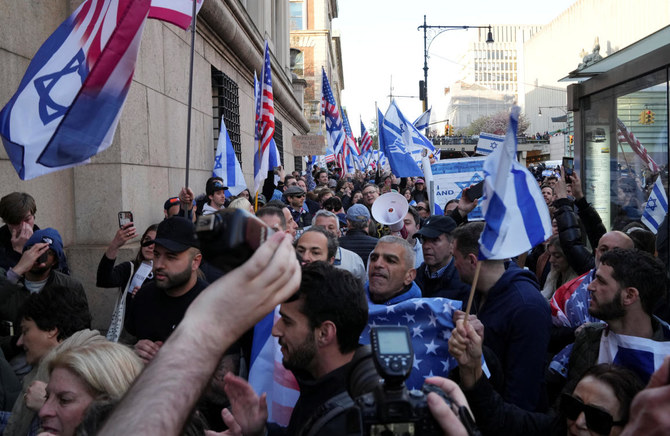
- The demonstrations began at Columbia University in New York and have since spread across the country
Tehran: Iran on Monday criticized a police crackdown in the United States against university students protesting against the rising death toll from the Israel-Hamas war in the Gaza Strip.
“The American government has practically ignored its human rights obligations and respect for the principles of democracy that they profess,” foreign ministry spokesman Nasser Kanani said.
Tehran “does not at all accept the violent police and military behavior aimed at the academic atmosphere and student demands,” he said.
American universities have been rocked by pro-Palestinian demonstrations, triggering campus clashes with police and the arrest of some 275 people over the weekend.
The demonstrations began at Columbia University in New York and have since spread across the country.
In Iran, hundreds of people demonstrated in Tehran and other cities on Sunday in solidarity with the US demonstrations.
Some carried banners proclaiming “Death to Israel” and “Gazans are truly oppressed,” state media reported.
The Gaza war broke out after the October 7 attack by Palestinian militants on Israel which killed 1,170 people, mostly civilians, according to Israeli figures.
Tehran backs Hamas, but has denied any direct involvement in the attack.
Israel’s retaliatory offensive against Hamas has since killed at least 34,488 people in Gaza, mostly women and children, according to the Hamas-run territory’s health ministry.
“What we have seen in American universities in recent days is an awakening of the world community and world public opinion toward the Palestinian issue,” Kanani said.
“It is not possible to silence the loud voices of protesters against this crime and genocide through police action and violent policies.”



